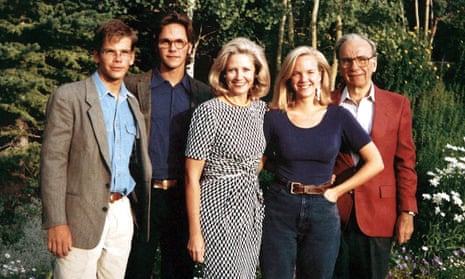There is a quietly extraordinary moment about halfway through the first episode of The Rise of the Murdoch Dynasty (Tuesday, 9pm, BBC Two), when Nigel Farage – who I am starting to feel convinced is less a real person than a concept, a tool invented by the BBC, kept captive in a cupboard deep within Broadcasting House and then, when it needs him, escorted out to the Newsnight stage and made to say something brief and inflammatory about Brexit – turns up.
Anyway, in the doc, Farage has just said something brief and inflammatory about Brexit, and then a runner comes on screen to tuck his mic cord in, and the mask slips. “To be honest with you, I did ask him whether he wanted me to do this,” Farage says unprompted, the capital-H Him in question the looming shadow of Rupert Murdoch himself. “If he’d said ‘No’ I wouldn’t have done it.” It’s a moment when you suddenly realise that Murdoch’s power is so wide-reaching that he has influenced a documentary about how influential he is. And he’s done it right in front of you. He’s David Copperfield, magicking away the Statue of Liberty, only here he’s made Nigel Farage say something denigrating about Tony Blair.
The Rise of the Murdoch Dynasty promises a lot, and very almost delivers it, though it is all over the place. The first thing we have to confront is the Succession parallel: it is, let me say, a little heavy-handed with that. The soundtrack is basically the supermarket, own-brand version of the actual Succession theme. The credits interlace grainy footage of the Murdoch family at their summer house, like Succession. At one point, the narrator literally says: “But before Rupert can think about succession … ” and there is a hard, knowing pause, before continuing “… he has a more pressing problem.” We get it lads, it’s like Succession. This comparison was fun for about a minute but three hours of it will grow wearing.
Episode one sets the scene: Murdoch, fuelled by an early-life slight that comes from only inheriting one newspaper when you expected to inherit three; the heirs apparent Elisabeth, Lachlan and James (Shiv, Roman, Kendall); the anointment of New Labour; the marriage to Wendi Deng. Beyond that, it’s the classic archive-footage-and-an-all-over-the-place-timeline-and-some-well-lit-talking-heads fare you’d expect.
Documentaries make for such great TV because they are the only thing on it, really, that allow the central character to be loathsome, cunning, hard-to-look-at and sinful, because nobody wants to watch five seasons of a scripted drama where the story is “this person is a bastard and then they win”. (“Ah, but Game of Thr … ” Let me stop you there. Game of Thrones had goodies throughout, and the final winner was a goth. It doesn’t count.)
Documentary inverts that dynamic, then allows us to revel in it: here’s a murderer, here’s an unspeakable crime, here’s a power grab mired in corruption and politics. And here’s Rupert Murdoch, squinting off the side of a yacht. What’s he going to do next? Who’s he going to buy or sweep into government? This story doesn’t end when the series does. This is just one tiny slice of bastard. For the rest of it, you’ll have to keep watching the news.
